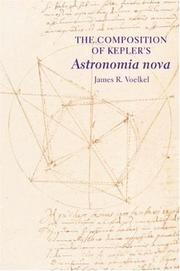| Listing 1 - 1 of 1 |
Sort by
|

ISBN: 0691007381 9780691007380 0691224013 Year: 2001 Publisher: Princeton (N.J.) : Princeton university press,
Abstract | Keywords | Export | Availability | Bookmark
 Loading...
Loading...Choose an application
- Reference Manager
- EndNote
- RefWorks (Direct export to RefWorks)
This is one of the most important studies in decades on Johannes Kepler, among the towering figures in the history of astronomy. Drawing extensively on Kepler's correspondence and manuscripts, James Voelkel reveals that the strikingly unusual style of Kepler's magnum opus, Astronomia nova (1609), has been traditionally misinterpreted. Kepler laid forth the first two of his three laws of planetary motion in this work. Instead of a straightforward presentation of his results, however, he led readers on a wild goose chase, recounting the many errors and false starts he had experienced. This had long been deemed a ''confessional'' mirror of the daunting technical obstacles Kepler faced. As Voelkel amply demonstrates, it is not. Voelkel argues that Kepler's style can be understood only in the context of the circumstances in which the book was written. Starting with Kepler's earliest writings, he traces the development of the astronomer's ideas of how the planets were moved by a force from the sun and how this could be expressed mathematically. And he shows how Kepler's once broader research program was diverted to a detailed examination of the motion of Mars. Above all, Voelkel shows that Kepler was well aware of the harsh reception his work would receive--both from Tycho Brahe's heirs and from contemporary astronomers; and how this led him to an avowedly rhetorical pseudo-historical presentation of his results. In treating Kepler at last as a figure in time and not as independent of it, this work will be welcomed by historians of science, astronomers, and historians.
Kepler's laws --- Kepler, Johannes, --- Kepler's laws. --- 53 <09> --- 53 <09> Physics--Geschiedenis van ... --- Physics--Geschiedenis van ... --- Kepler, Johannes. --- Kepler, Johannes --- Astronomia Nova. --- SCIENCE / History. --- Argonauts. --- Aristarchus. --- Book of Nature. --- Bürgi, Joost. --- Columbus, Christopher. --- Counter-Reformation. --- Delambre. --- Dionysius the Areopagite. --- Eriksen, Johannes. --- Eudoxus. --- Fabricius, Johannes. --- Frankfurt. --- Geminus. --- Gordian knot. --- Gruppenbach. --- Heraclides. --- Hercules. --- Hipparchus. --- Jupiter. --- Koestler, Arthur. --- Limnaeus, Georg. --- Lucan, Civil War. --- Magellan. --- Marius, Simon. --- Mars. --- Marägha school. --- Melanchthon, Philipp. --- Mercury. --- Mira Ceti. --- Newtonian synthesis. --- Oswald, Johannes. --- Peucer, Caspar. --- Posidonius. --- Ptolemy. --- Pythagoras. --- Pythagoreans, secrecy of. --- Rhodius, Ambrosius. --- Saturn. --- Seleucus. --- area law. --- conchoid. --- earth. --- epicyclic distance model. --- equant. --- geo-heliocentrism. --- index of prohibited books. --- logos. --- nova of 1604. --- optical equation. --- peer review. --- physical equation. --- rhetoric. --- scholasticism. --- Kepler, Johannes, - 1571-1630. - Astronomia nova --- Kepler laws --- Kepler's laws of planetary motion --- Planetary motion, Kepler's laws of --- Planetary theory --- Planets --- Orbits
| Listing 1 - 1 of 1 |
Sort by
|

 Search
Search Feedback
Feedback About UniCat
About UniCat  Help
Help News
News